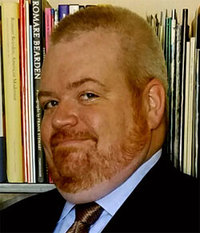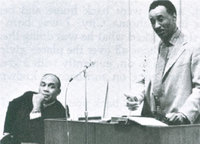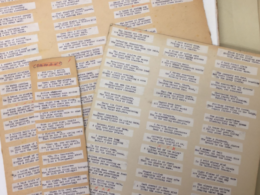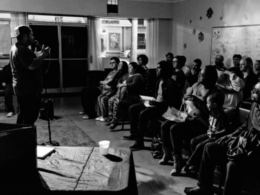By Paul Devlin

This is a slightly expanded version of an essay that appeared in the program for “Albert Murray in Words and Music,” a tribute at the American Repertory Theater at Harvard University on March 6 that included readings and riffs by Library of America President Cheryl Hurley; Henry Louis Gates, Jr. and Paul Devlin, co-editors of the Library of America volume Albert Murray: Collected Essays & Memoirs; jazz musician and composer David Murray; and Murray’s literary executor, Lewis P. Jones III, as well as a performance by the The David Murray Quintet.
Albert Murray’s career intersected with Harvard University on several occasions from 1973 to 2007. In 1953, Ralph Ellison, after participating in a Harvard-sponsored conference on fiction, wrote a letter to Murray on Faculty Club stationery, and said of Harvard, “this might be an interesting place for you to teach. You’d be among peers.” Murray was thirty-seven at that time, on active duty in the Air Force, and teaching in the ROTC program at Tuskegee Institute. (Ellison’s next sentence is not entirely relevant here, but it is amusing. He wrote “Incidentally, we’re told that Henry James once lived in this house, which is probably true—I haven’t been able to sleep in it.”)
Captain Murray was to become familiar with Cambridge and environs when he was a stationed at Hanscom Air Force Base in nearby Bedford, Massachusetts from early 1961 to mid–1962. Around this time he started shopping at the Andover Shop in Cambridge and became friends with its proprietor, Charlie Davidson (who was also an Air Force veteran). Murray retired as a Major on June 29, 1962 and moved to New York to begin writing full time.
Murray spoke at Harvard for the first time on December 1, 1973, at the invitation of Lewis P. Jones III (AB ’74), editor of a special issue of the Harvard Advocate, “Black Odyssey; A Search for Home.” Jones got in touch with Murray through Charlie Davidson, after having been introduced to Davidson by Lee Daniels (AB ’71). When Jones invited Murray to contribute to the issue, Murray suggested holding a symposium on Alain L. Locke (a member of the Harvard class of 1908 and the first African American Rhodes Scholar) and then printing a transcript of the symposium in the special issue of the Advocate. Murray recruited Ralph Ellison to appear on the symposium, which also included Harold Cruse and Nathan Huggins.

The symposium was sponsored through the support of Archie C. Epps III, Harvard College Dean of Students, and was intended to be an annual event at Harvard “to address and understand aspects of the Afro-American experience through the language of the university.” Murray’s contribution was significant and his words in the Advocate have been quoted in scholarly works. Murray also recruited Romare Bearden to design the cover of the special issue. Other Harvard students who worked on the issue as associate editors included Faith Davis, Philip Drysdale, and Henry McGee (a Harvard Crimson recruit). Jones went on to become a close friend of the Murray family and began managing the family’s affairs in 2005 at Murray’s request. He is the executor of the Murray estate, trustee of the Albert Murray Trust, and Murray’s literary executor.
In 1980, after Nathan Huggins became chair of the Afro-American Studies Department, he offered Murray a job. He asked in a letter of December 3, 1980, “Are there any circumstances or terms in which you would consider coming to Harvard and this department?” Murray’s reply is unknown (he saved copies of only a small percentage of outgoing letters), but he didn’t pursue the opportunity. At the time he was working on two book projects: one with Romare Bearden and Sam Shaw, which was ultimately not published, and one with Count Basie, which became Good Morning Blues (1986), one of the most highly regarded autobiographies in the history of music, which was republished last year by the University of Minnesota Press.
In November 1985 Murray spoke at Harvard again. This time it was at the invitation of Professor Werner Sollors. Murray wrote a long theoretical essay about his work on Count Basie, titled “Comping for Count Basie,” which he first delivered as the Peter Rushton Lecturer at the University of Virginia, and which Sollors published in his edited collection The Invention of Ethnicity (1989).
In 1998 Murray transferred about half of his archive to Harvard’s Houghton Library. On June 3, 2007, Henry Louis Gates, Jr., who had known Murray since the 1970s and wrote a classic profile of him for The New Yorker in 1996, bestowed the W. E. B. Du Bois Medal of Harvard’s W. E. B. Du Bois Institute on Murray at a crowded ceremony in Murray’s apartment. In late 2016, Harvard’s Hutchins Center for African and African American Research acquired the other half of Murray’s archive. Albert Murray first came to Harvard to share his thoughts with students on the Advocate staff who were pondering “a search for home,” and his papers found their home there in 2016.
Paul Devlin, co-editor of the Library of America volume Albert Murray: Collected Essays & Memoirs, teaches English at the U.S. Merchant Marine Academy and has published essays and criticism in many periodicals. He is the editor of Murray Talks Music: Albert Murray on Jazz and Blues (2016) and Rifftide: The Life and Opinions of Papa Jo Jones, as told to Albert Murray (2011), a finalist for the Jazz Journalists Association’s book award.



